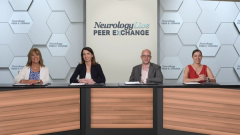
Initiating Conversations Around Cognitive Health for Patients With MS
Experts in neurology comment on the level of patient awareness surrounding cognitive decline in multiple sclerosis and highlight how to engage patients in difficult conversations regarding their cognitive health.
Episodes in this series

Stephen Krieger, MD: This is a great start on thinking about how we assess cognition. Let's turn to how we talk to our patients about it. I think this is actually quite challenging because the way in our culture and our society we think about cognitive dysfunction, it's so tied to our sense of self and our identity and our vocation and our abilities. And I think it's intrinsically a sensitive topic for people who are or are not cognitively affected. Let's start by thinking about patients' awareness of cognitive troubles. Do you feel, Dr Crayton, that your patients are generally aware of it? And if not, how do you bring someone's attention to their cognitive troubles from MS [multiple sclerosis]?
Heidi Crayton, MD: I think people for the most part have a little idea. It's just about usually being so incredibly frightened that they really don't want to bring that to the forefront. Also, they don't want to be vulnerable in their family. When there's somebody who's part of the family or a significant other who's there who can help gently bring that about, it's also good. It can be helpful. But what I try to focus on is talking about maybe there's some cognitive dysfunction here, and that we need to optimize the things that we can. Sleep and mood are huge. And those things I really focus on initially to detract, I guess, a little bit from the frank cognitive decline that I know is going to be prevalent. And I've seen their MRI [magnetic resonance imaging], so I know that there is structural reason for this. But to really try to optimize sleep and mood to get the best that we can out of what we have.
Stephen Krieger, MD: Well, I think those are 2 really important points. Both sleep deprivation and depression can replicate cognitive dysfunction—can worsen it.
Heidi Crayton, MD: All of us who actually rotated through training at the VA [Veteran’s Affairs], we were called all the time for dementia consult and pseudodementia from depression, and people, elderly people that had been ripped out of their home and relocated and their spouse had died. They presented as demented people. We do know; we've all been trained in this concept of pseudodementia for other reasons.
Stephen Krieger, MD: I think similarly the flip side of depression is anxiety, and I think anxiety also replicates symptoms of cognitive dysfunction and because people feel that they don't remember anything, but I think a lot of the time it's because they weren't intentional.
Heidi Crayton, MD: They're juggling too many balls. You're not in present time and you're just juggling too many balls.
Stephen Krieger, MD: Right. They weren't present and so if they never encoded that information in the first place, it certainly feels to them like a memory problem on the other end, but I think anxiety can have a lot to do with it. Dr Nicholas, how about for you? We heard about mood and sleep and anxiety. How else do you talk to your patients about cognitive function and dysfunction?
Jacqueline Nicholas, MD: I think it's important to actually bring it up early—especially when we're talking to patients about the importance of why they need to have a routine follow-up and manage their disease with disease-modifying therapy, because oftentimes, early on, people feel pretty good. They're not thinking about that long-term, but from day 1 we're talking about the fact that MS is not only a physical disease but also affects your cognition and what we do now will help you to stay in that crew that you love long-term, or help you to engage in conversations with your friends socially and your loved ones. We talk about how not addressing that can actually take away that identity that you have. Similar to Dr Crayton, I talk about some of those factors that are very important to optimize cognition. I would also add that we talk a lot about exercise, which I know sometimes when people aren't sleeping or they're fatigued, they want to throw something at me when I bring up the idea of how important that is, but there have been a number of studies showing how that really can benefit and optimize cognition in MS and I think people are excited that there's something that they can do to try to maintain and make their focus a bit better.
Stephen Krieger, MD: I like that in all the ways you talked about it, you used the cognitive piece as part of the call to action. To protect cognitive function, the importance of disease-modifying therapy. To boost cognitive function, the importance of physical exercise and healthy habits. I like that. To Dr Nelson, you talked about the detailed way that you assess cognitive function. Probably the most detailed I can say of all of us. How do you talk to your patients about those results when you're monitoring a patient's cognitive function? Do you counsel them about it, do you take them through what those results mean? Tell us a little bit about how you deal with that?
Flavia Nelson, MD: Because I've been doing research in cognitive impairment for the past 17 years, I feel like I had to be not just doing the research, but doing the practical and try to assess it better because it's difficult, as I said. What I do is, the results of the rest of the visit is called the CARE visit—comprehensive annual reference exam, because like I’ve said, there are many items to it, including surveys on fatigue, anxiety, depression, et cetera. It's a comprehensive assessment, but based on scores. I meet with them after that for just a half an hour, or maybe 15 to 20 minutes—depending on the results—just to go over the results of their BICAMS [Brief International Cognitive Assessment for Multiple Sclerosis], of the cognitive screening and basically explain to them “Your cognitive screening was normal; we'll do this again in a year or 2,” or “Your cognitive screening was a little abnormal; I would like to refer you for a complete 3- to 4-hour neuropsychological evaluation which is a lot more comprehensive than what we do,” and they're usually OK with that. And then, we talk, of course, about, “Are you depressed? Are you anxious? How did you feel during the exam?,” et cetera. Unfortunately, you're right. Anxiety—it's very prevalent among MS patients and it's something that I think needs to be under better control before… they build a complete neuropsychological evaluation—and sometimes it's depression as well. Once we know that those things are under better control, including fatigue, as well—I also recommend exercise, which I think is 1 of the best ways to fight it. Once we know that those things are under control, then I highly recommend a complete neuropsychological evaluation, and then we go over the results. The neuropsychologist goes over the results with them, and then we go over it again because I want to know how much did they retain from that review and how much they understand, and what they need to do about it. It's time-consuming, but it's worth it. I see the results.
Transcript Edited for Clarity
Newsletter
Keep your finger on the pulse of neurology—subscribe to NeurologyLive for expert interviews, new data, and breakthrough treatment updates.













